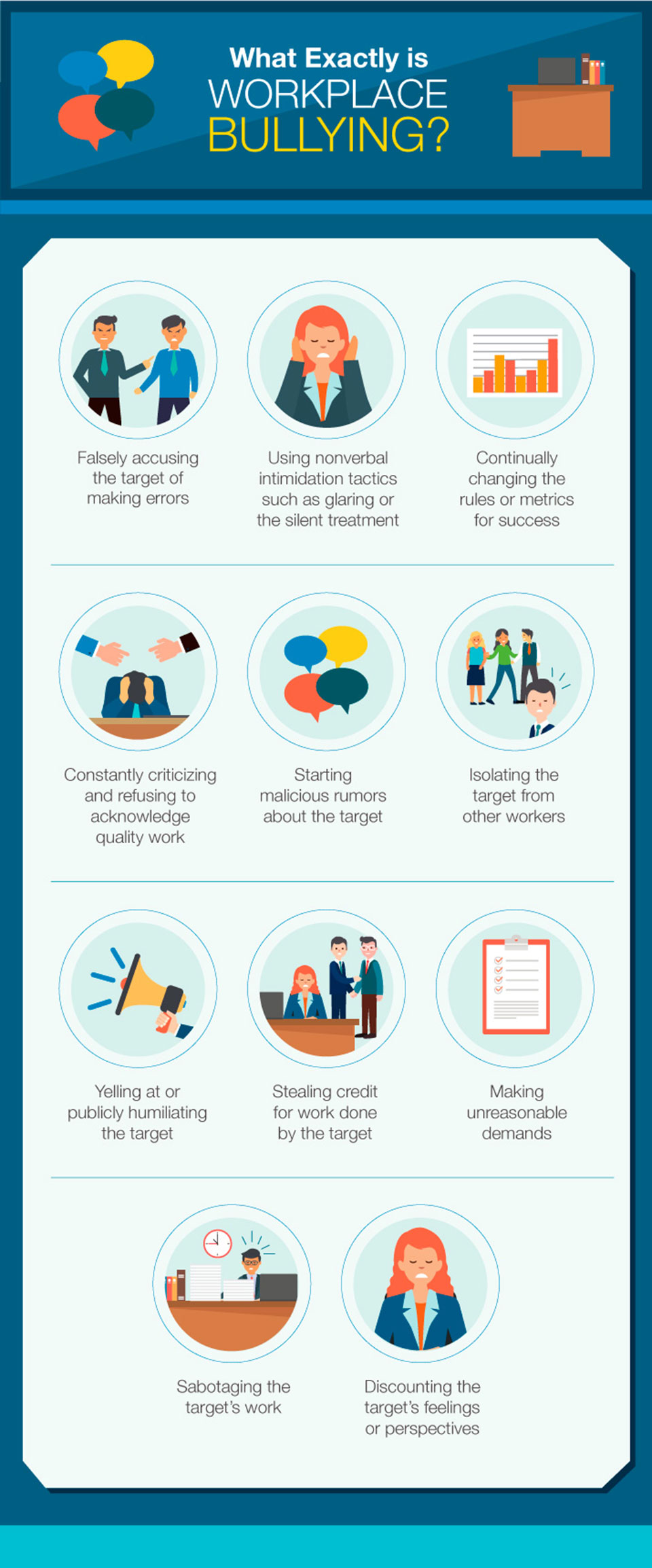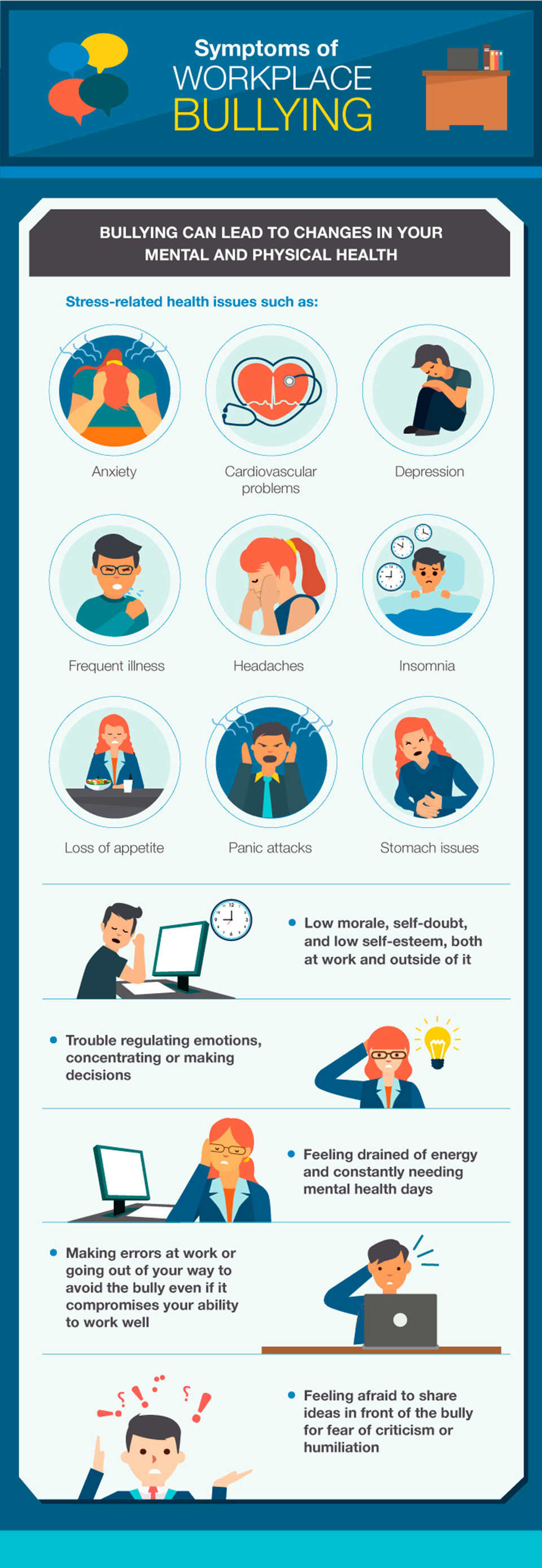Bullying isn't just for kids. Far from being confined to the playgrounds of our youth, bullies roam the halls of our offices and other places of work as adults. In fact, workplace bullying is so common that up to 35 percent of workers in the U.S.—or around 54 million people—report being bullied in the office, while 15 percent report witnessing workplace bullying.
Whether you're a target, a witness, or a supervisor of a bully, here's what you need to know to cope with bullying in the workplace successfully (and professionally).
What Is Workplace Bullying?

According to the Workplace Bullying Institute, workplace bullying consists of repeated, harmful mistreatment by one or more perpetrators who target their victims with conduct that is threatening, humiliating, abusive, isolating, and/or sabotaging. More than 50 percent of bullying is committed by perpetrators who outrank their targets; around one third is conducted by the target's peer(s).
Common bullying behaviors may include:
- Falsely accusing the target of making errors
- Using nonverbal intimidation tactics such as glaring or the silent treatment
- Continually changing the rules or metrics for success
- Constantly criticizing and refusing to acknowledge quality work
- Starting malicious rumors about the target
- Isolating the target from other workers
- Yelling at or publicly humiliating the target
- Stealing credit for work done by the target
- Making unreasonable demands
- Sabotaging the target's work
- Discounting the target's feelings or perspectives

While anyone can be a target of bullying, typically targets possess positive traits such as being kind, cooperative, well educated, well liked by upper management, or skilled at their jobs. Perhaps partly as a result of their amicable demeanors, targets suffer greatly at the hands of bullying coworkers. Symptoms of workplace bullying include:
- Stress-related health issues such as cardiovascular problems, anxiety, headaches, stomach issues, loss of appetite, insomnia, depression, panic attacks, and frequent illness
- Low morale, self-doubt, and low self-esteem, both at work and outside of it
- Trouble regulating emotions, concentrating, or making decisions
- Feeling ill every night before work, or upon waking up for work in the morning, or generally dreading going to work
- Feeling drained of energy and constantly needing mental health days
- Making errors at work or avoiding the bully even if it compromises productivity
- Feeling afraid to share ideas in front of the bully for fear of criticism or humiliation
- Feeling helpless, depressed, ashamed, or like there is no way out
The important thing to remember is that no matter how miserable a target may feel, they still have worth and agency. Read on to learn how to cope.
How to Cope with a Workplace Bully if You're in Charge
As a supervisor, you may be responsible for regulating workplace bullying even if you aren't directly involved in it. If you notice an employee is either the target or the perpetrator, it's your responsibility to step in and create a healthier work culture for the whole team. Here are some tips to initiate that process:
- Establish a habit of prompt conflict resolution
Be proactive about resolving personality conflicts as they arise. This will send the message that positive interactions are the rule, not the exception. - Take bullying accusations seriously
If a witness or target reports workplace bullying, don't shrug it off or sweep it under the rug. Investigate and address the conflict in a professional manner, without blaming the target or undermining their confidentiality. - Document everything
This not only facilitates an investigation but also provides proof that as a manager, you did what you could to address the situation. - Model positive interactions
Acknowledge the target's accomplishments, treat everyone with respect and appreciation, and demonstrate healthy interpersonal relations. With these actions, you exhibit positive reinforcement and advocate the type of behavior you expect from everyone on the team. - Put it on the books
Show you're serious about curtailing workplace bullies by naming bullying as unacceptable behavior in the employee handbook. Create systems to investigate accusations of bullying and curb bullying behavior.
How to Cope with a Workplace Bully if You're the Target
When you're the victim of a workplace bully, it's easy to feel helpless—in fact, bullying is designed to conjure feelings of vulnerability. But there are ways to address bullying and create a better work environment. Start with the actions below.
- Name bullying for what it is
Many people are unaware that workplace bullying occurs. If you're suffering at the hands of a bully, the first step is to acknowledge that you are being psychologically harassed, emotionally abused, or bullied—whichever term works best for you.
Then commit to making your wellbeing a priority, even in the face of the abuse. Remind yourself that your health is worth advocating for—this helps keep you motivated to address the bullying no matter what it takes. - Be assertive
If you feel up to it, call out the bully's behavior as it happens. If they call you a name or raise their voice at you, calmly and clearly state how you would like to be treated instead. Then articulate the possible consequences if the behavior doesn't change: for instance, “If you continue to insult me in this manner, I will need to speak with our supervisor and potentially make a formal complaint.” If the behavior continues, follow through on those consequences. Enforce healthy boundaries by refusing to work unreasonable hours or redoing work that's already satisfactory.
It's important not to assign yourself too much responsibility for the situation. The issue here is the other person—not you. Ultimately, the bully is responsible for the unhealthy dynamic taking place. Without taking action, it's unlikely the bully will change, and certainly not as quickly as you'd like them to. You can't control their behavior, so don't take too much responsibility for the situation. Addressing workplace bullying is the responsibility of the employer and no one else. - Keep records
Bullies are sly and typically won't treat a target poorly in front of supervisors, which makes it harder to call out their behavior. Circumvent this issue by documenting every incident, from verbal abuse written in an email to hostile criticism in a meeting. Note the date and time of each incident as well as any eyewitnesses, and keep copies of written or digital correspondence. It may also be helpful to digitally record conversations with your bully, but first make sure you reside in a single-consent recording state, meaning it's legal for you to record verbal exchanges with the bully without his or her knowledge and use those recordings when making your formal complaint. - Make your case
Once you document the bully's behavior, your next option is to report it. Start by reporting the abuse to your immediate supervisor. If your supervisor is the bully, try reporting them to a manager who is at least two levels above that person.
When making your case, try to frame the issue as a cost to the business. Even though the emotional toll it takes on you is legitimate, you can bolster your case by framing it as more than a personal issue. Keep the emphasis on how the bullying affects team morale and work performance.
While it may be tempting to report the case to Human Resources, especially if your supervisor isn't receptive to your claims, keep in mind that HR works for management. Regardless of whether you speak to a supervisor or HR, if your employer rationalizes or excuses the bullying, then it may be time to start looking for a job at a company that treats its employees with respect. - Expect retaliation
Once you report the bully's behavior, it's likely they'll get wind of it. Expect them to attempt to get back at you in subtle ways, even if they've promised your superior they will make amends. Even if they act nicer to you in public, don't let your guard down by sharing personal information—it's likely they may use this against you down the road. - Enlist support
Being the target of bullying is extremely stressful, and it's helpful to have a support system in place to cope. Seek comfort from friends, family members, and other people outside of workplace politics. It may even be helpful to enlist the support of a professional counselor or therapist. Also be sure to prioritize other aspects of self-care, including a healthy diet, exercise, and sleep. Staying healthy can make it that much easier to cope. - Consider legal action
For the most part, workplace bullying is not illegal, which can make it hard to address via the legal system. But if your company refuses to take action on your behalf despite filing a formal complaint, it may be helpful to consult an attorney who specializes in employment law. They can help decide whether you have a case that's viable for court. - If necessary, leave
The stress of being bullied can take a serious toll on your mental and physical health and work performance. In other words, the situation is hardly one that's best for career advancement. If the company fails to take meaningful action despite your filing a formal complaint, then it's probably time to look for a new employer. You won't be alone—up to 77 percent of bullying targets lose their jobs either involuntarily or by choice.

Workplace bullying is serious business, especially for the targets of abuse. Whether you're the supervisor of a bully or you've been singled out by one, it's important to prioritize the wellbeing of the victim and the office as a whole. Make it a policy that bullying won't be tolerated at work, life, or anywhere in between—whether that means advocating for yourself or your employee or walking away.
Share this infographic on your site
Laura Newcomer
Laura Newcomer is a writer, editor, and educator with multiple years of experience working in the environmental and personal wellness space. Formerly Senior Editor at the health site Greatist, Laura now lives and works in Pennsylvania. Her writing has been published on Washington Post, TIME Healthland, Greatist, DailyBurn, Lifehacker, and Business Insider, among others. She has taught environmental education to students of all ages in both Pennsylvania and Maine, and prioritizes living an environmentally sustainable lifestyle. She's a big proponent of creating self-sustaining communities and accessible healthy food systems that care for both people and the earth. An avid outdoorswoman, she can often be found hiking, kayaking, backpacking, and tending to her garden.


